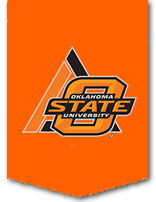Key global trends define future of food safety
By Laci Jones, FAPC Communications Services Student, and Mandy Gross, FAPC Communications Manager
(Stillwater, Okla. – May 7, 2015) A Walmart food safety executive for global brands and expert in food safety culture shared insights about key global trends in food safety, helping Oklahoma State University’s Robert M. Kerr Food & Agricultural Products Center to identify ways to better focus FAPC programs serving Oklahoma agribusinesses.
Frank Yiannas, vice president of food safety and health for Walmart discussed the six trends – changing food systems, foodborne surveillance, globalization, ingredients, social media and criminalization – during a recent visit to the OSU-Stillwater campus.
“People say, ‘Frank, you like to think of yourself as a food safety futurist,’” he said. “It is a compliment because I do spend a lot of time thinking about the future. One thing I have learned is to be a good futurist, you must understand and learn from the past.”
Yiannas, author of two books, Food Safety = Behavior: 30 Proven Techniques to Enhance Employee Compliance and Food Safety Culture: Creating a Behavior-Based Food Safety Management System, said during the history of food processing, manufacturers and researchers have made progress in winning the battle against foodborne diseases.
“Never before in history has the responsibility to provide safe and affordable food to so many rested on the shoulders of so few,” Yiannas said.
When researchers win one battle against a foodborne disease, another disease emerges, he stressed. However, the progress in the foodborne illness battle has plateaued in recent years.
“The strategies and the techniques that we used [in the past] are not necessarily what we have to do to make our healthy 2020 goals,” Yiannas said.
Yiannas contends these trends add up to be challenges to food safety, and to conquer these challenges, food safety managers and researchers need to be less traditional in their methods.
“The future of food safety is at a crossroad,” he said. “We must decide between using the methods we have used for the last 100 years or to be innovative and take a different path.”
Yiannas said he believes food sustainability will become more important in the future, and he is confident in the next generation of food leaders.
During the April 21 visit, Yiannas met with OSU faculty, staff and students, and members of FAPC’s Industry Advisory Committee.
Jason Young, FAPC quality management and global food safety initiative specialist, said it was a wonderful opportunity to have a world leader in food safety on campus to provide insights.
“It is amazing to share what FAPC is doing with a Walmart leader,” Young said. “I think Mr. Yiannas was impressed with how FAPC is working to not only bring the food safety knowledge to the industry, but also to students looking at food industry and food safety careers.”
FAPC, a part of OSU’s Division of Agricultural Sciences and Natural Resources, provides services and programs to meet the food safety and security needs of Oklahoma’s food industry, said Roy Escoubas, FAPC director.
“Globalization of the food industry has significantly affected almost every Oklahoma food processor directly and indirectly,” Escoubas said. “With the help of our advisory board, FAPC has implemented a Global Food Safety Initiative program to assist our Oklahoma food processors as they undergo rigorous auditing for food safety, security and defense programs. Mr. Young stands ready to help these food companies.”
FAPC’s GFSI program focuses on direct food industry assistance in the areas of training, auditing, pre-third-party audit preparations, education, and in-plant technical assistance for food safety and quality programs.
The state-of-the-art center offers a variety of food safety trainings covering topics such as Hazard Analysis Critical Control Points, BRC Global and Safe Quality Foods for food processors. These opportunities also are available to students of the newly approved food safety degree option available through OSU’s College of Agricultural Sciences and Natural Resources.
“These trainings will help prepare students for food safety positions in the food-manufacturing industry,” Escoubas said. “Graduating students with food safety credentials not only provides industry with prepared workforce, but it also provides numerous opportunities for the graduates.”
More information about Yiannas’ visit and presentation are available at http://fapc.biz/workshops/global-trends-in-food-safety-seminar.
- ### -
Oklahoma State University is a modern land-grant system of interdisciplinary programs that prepares students for success. OSU is America’s Brightest Orange. Through leadership and service, OSU is preparing students for a bright future and building a brighter world for all. As Oklahoma’s only university with a statewide presence, OSU improves the lives of people in Oklahoma, the nation and the world through integrated, high-quality teaching, research and outreach. OSU has more than 36,000 students across its five-campus system and more than 24,000 on its combined Stillwater and Tulsa campuses, with students from all 50 states and around 120 nations. Established in 1890, OSU has graduated more than 245,000 students to serve Oklahoma, the nation and the world.

